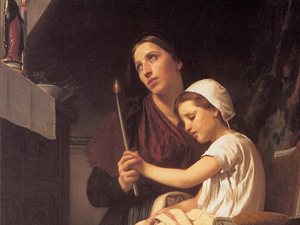 An elderly woman stands at the votive candle area and lights eight large candles. She says a prayer and then finds her place in the pew.
An elderly woman stands at the votive candle area and lights eight large candles. She says a prayer and then finds her place in the pew.
On exiting the Church, a young girl, no more than ten years old, lights a small candle with her dad watching on. Her dad told her to say a prayer for her grandmother.
There is something unique and special about a candle. Maybe the elderly woman who lit eight candles was praying for the conversion of her family members who no longer practice the faith. Maybe the ten year old girl was praying for her grandmother’s healing or the repose of her soul.
It is a common occurrence, an amazing sight to see someone rise from their pew, and walk over to the votive area, light a candle, make the Sign of the Cross, say a short prayer, and then return to their pew. Whenever this happens, I must admit that I always marvel at the expression of that person’s faith.
I do not know their situation. I do not know what has motivated them to light that candle. But what I know is that there is a reason why they have done so, and furthermore in lighting their candle, they have made a statement: they believe in prayer and the intercessory power of the saints.
The practice of votive candles, of course, is not limited to the parish church. Perhaps its most common expression is made through the practice of religious pilgrimages to holy sites, be it a shrine or a Marian apparition site. In 2010, Bishop David Ricken proclaimed an 1859 Marian apparition received by Adele Brise worthy of belief.
Immediately following the proclamation, people began to submit requests for votive candles to be lit through an online web form, by telephone, and mail. The Shrine of Our Lady of Good Help received so many requests that they could no longer accommodate all the requests. People believed there to be something special and unique about having a candle lit at the site where Mary appeared so many years earlier.
Other shrines, like the Shrine of Our Lady of Guadalupe in La Crosse, Wisconsin, have built a votive chapel to accommodate requests. Lighting a candle while on pilgrimage has become a custom, a popular religious devotion.
Lighting a candle in church is not only a custom in the West, but is also practiced by Eastern Churches. Visitors purchase a small taper, light it, and then place it in the sand. It is not uncommon for a person to visit an Eastern Church only to light a candle and say a quick prayer before continuing on to their next destination. The devotion is the same, but its practice different.
Lighting candles is part of the ritual of pilgrimage for many people. I know this first hand as a pilgrim myself to shrines here in the United States like Our Lady of Good Help, Our Lady of Snows, or Marytown. I lit candles during my ten week pilgrimage to the Holy Land, and when I visit to Canada next month, I know I’ll light candles there too. I’ll say a prayer for my grandmother’s soul at the Shrine of St. Anne de Beaupre in Quebec City and I’ll pray that I can imitate the virtues of St. Joseph as I become a spiritual father.
And when I light these candles, I’ll offer a prayer that Marytown has posted by their votive candles, and maybe the next time you light your candle, you will too.
Lord, the light which I am giving, is a little of what I have, a little of my time, a little of myself which I am leaving before the Lord and the Virgin Mary.
This light symbolizes my prayer which will continue even as I go my way.
Lord, may this candle I am lighting be the light with which you enlighten me in my difficulties and decisions.
May it be the fire with which you burn away the selfishness and impurity in me.
May it be the flame with which you warm my heart.
I cannot remain for long in your church, by leaving this candle burning I want to give you something of myself.
Help me continue to pray in the midst of my daily activities.
Amen.



